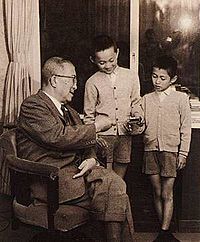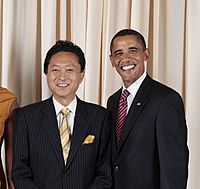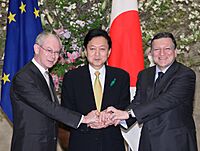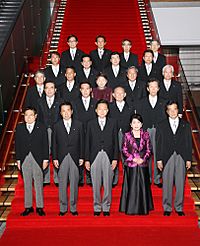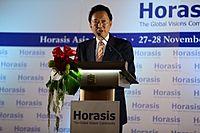Yukio Hatoyama facts for kids
Quick facts for kids
Yukio Hatoyama
|
|
|---|---|
|
鳩山 友紀夫
|
|
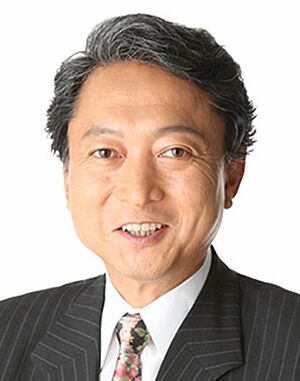
Official portrait,c. 2007
|
|
| Prime Minister of Japan | |
| In office 16 September 2009 – 8 June 2010 |
|
| Monarch | Akihito |
| Deputy | Naoto Kan |
| Preceded by | Tarō Asō |
| Succeeded by | Naoto Kan |
| President of the Democratic Party | |
| In office 16 May 2009 – 4 June 2010 |
|
| Preceded by | Ichirō Ozawa |
| Succeeded by | Naoto Kan |
| In office 25 September 1999 – 10 December 2002 |
|
| Preceded by | Naoto Kan |
| Succeeded by | Naoto Kan |
| Member of the House of Representatives | |
| In office 23 June 1986 – 16 December 2012 |
|
| Preceded by | Multi-member district |
| Succeeded by | Manabu Horii |
| Constituency | Hokkaido 4th (1986–1996) Hokkaido 9th (1996–2012) |
| Majority | 122,345 (40.2%) (2009) |
| Personal details | |
| Born | 11 February 1947 Bunkyō, Tokyo, Empire of Japan |
| Political party | Independent |
| Other political affiliations |
LDP (before 1993) NPS (1993–1996) DP (1996–1998) DPJ (1998–2012) Independent (2012–2020) Kyowa (2020–2022) |
| Spouse |
Miyuki Hatoyama
(m. 1975) |
| Children | Kiichirō Hatoyama |
| Parents | Iichirō Hatoyama Yasuko Hatoyama |
| Relatives | Hatoyama family |
| Education | University of Tokyo (BE) Stanford University (PhD) |
| Signature | |
| Website | Official website: https://www.hatoyama.gr.jp/ |
Yukio Hatoyama (鳩山 友紀夫, born 鳩山 由紀夫, Hatoyama Yukio, born 11 February 1947) is a Japanese politician who is now retired. He served as the Prime Minister of Japan and was the leader of the Democratic Party of Japan (DPJ) from 2009 to 2010. He was the first Prime Minister from the modern Democratic Party of Japan.
Hatoyama was first elected to the House of Representatives, which is like a parliament, in 1986. In May 2009, he became the leader of the DPJ, which was the main opposition party at the time. He then led his party to a big win in the 2009 general election. This victory ended the long rule of the Liberal Democratic Party (LDP), which had been in power for more than ten years. He represented the Hokkaido 9th district in the House of Representatives from 1986 until 2012.
In 2012, Hatoyama announced that he was retiring from politics. Since then, he has been very active online, especially on Twitter, sharing his political opinions. He caused some discussion when he visited Crimea in 2015. He also made a controversial statement in 2023 about a possible nuclear strike, for which he later apologized. Hatoyama helped start a small political group called the Kyowa Party in 2020, but he later left it.
Contents
Early Life and Family Background
Yukio Hatoyama comes from a very important political family in Japan. This family is sometimes compared to the Kennedy family in the United States because of their strong presence in politics.
Hatoyama was born in Bunkyō, Tokyo. He is a fourth-generation politician, meaning his family has been involved in politics for many generations. His great-grandfather, Kazuo Hatoyama, was the speaker of the House of Representatives in Japan from 1896 to 1897. Kazuo also served as the president of Waseda University. His great-grandmother, Haruko Hatoyama, helped start what is now known as Kyoritsu Women's University.
His grandfather, Ichirō Hatoyama, was also a very important politician. He served as Prime Minister and was one of the founders and the first leader of the Liberal Democratic Party in 1956. As Prime Minister, he helped Japan restore its relationships with the Soviet Union. This paved the way for Japan to become a member of the United Nations.
Yukio Hatoyama's father, Iichirō Hatoyama, was the Foreign Minister for a period. His mother, Yasuko Hatoyama, is the daughter of Shojiro Ishibashi, who founded the famous Bridgestone Corporation. Yasuko Hatoyama was known for giving a lot of financial support to her sons' political careers. She donated a lot of money when Yukio and his brother Kunio started their first Democratic Party of Japan in 1996.
His younger brother, Kunio Hatoyama, also served as a government minister. Yukio Hatoyama met his wife, Miyuki Hatoyama, while he was studying at Stanford University in the United States. They got married in 1975. Their son, Kiichirō (紀一郎), is an engineering researcher. Kiichirō Hatoyama followed his father into politics and was elected to the House of Representatives in the October 2024 election.
Before entering politics, Hatoyama worked as an assistant professor at Tokyo Institute of Technology and later as an associate professor at Senshu University.
Political Journey
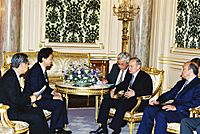
Yukio Hatoyama began his political career in 1986 when he was elected to the House of Representatives. He represented the Hokkaido 9th District as a member of the ruling Liberal Democratic Party (LDP). In 1993, he left the LDP to help form a new party called the New Party Sakigake. He later joined the newly formed Democratic Party (Japan, 1996).
Hatoyama and his younger brother, Kunio Hatoyama, together created the Democratic Party of Japan (DPJ). Their mother, Yasuko, provided significant financial support for this new party. Kunio Hatoyama later left the DPJ, feeling it had moved too far from its original ideas, and rejoined the LDP. Yukio, however, stayed with the DPJ as it grew and merged with other opposition parties in 1998.
Yukio Hatoyama became the chairman and leader of the opposition for the Democratic Party of Japan from 1999 to 2002. He later became the Secretary-General of the DPJ. In May 2009, he became the party leader after the previous leader resigned. He was chosen by other party members, winning a majority of the votes.
Because of his unique appearance and style, some people nicknamed him "ET" or "The Alien." His wife said he earned this nickname because he was so different from traditional Japanese politicians. Another common nickname was "Popo," which comes from a Japanese children's song about a pigeon, as the first part of his last name, "Hato," means pigeon.
Time as Prime Minister (2009–2010)
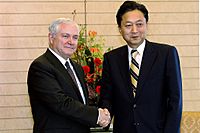
When Hatoyama became Prime Minister, he had a high approval rating from the public. The DPJ had promised to stop wasteful spending on large public projects. They wanted to use that money instead for tax cuts and support for families. People had high hopes that he would bring big changes compared to the previous government.
However, Hatoyama's popularity began to drop. The DPJ found it hard to meet all the high expectations they had set, especially as the economy was struggling. In May 2010, he faced the possibility of a vote to remove him from office. On June 2, 2010, Hatoyama announced that he would resign as Prime Minister.
Even though Yukio Hatoyama was Prime Minister for less than a year, he achieved several things during his time in office. These included:
- Starting a government payment for families with young children.
- Making public high school tuition free.
- Introducing a program to support rice farmers' income.
- Bringing back a special allowance for single-mother households.
- Greatly increasing spending on social programs, including child care, nursing care, and medical care.
- Increasing the education budget.
- Expanding the student scholarship system to help more students.
- Extending employment insurance to cover all workers.
- Reducing medical costs for unemployed people.
- Ending age-based differences in medical services.
- Expanding help for public rental housing that supports elderly people and families with children.
- Introducing free welfare services and equipment for low-income people with disabilities.
Money Matters and Spending
In December 2009, a financial issue caused Hatoyama's popularity to fall. It was found that he received donations that were not properly reported. Much of the money came from his wealthy mother. This issue raised questions about his trustworthiness and highlighted his privileged background. Prosecutors decided not to pursue charges against him, saying there wasn't enough evidence of criminal activity.
The DPJ also created a group to review government spending. They promised to cut a large amount of money, but they only managed to cut a smaller portion. Hatoyama even had to go back on a promise to cut road-related taxes, including a gasoline tax. He faced criticism from some members of his own party.
Foreign Policy Goals
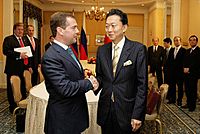
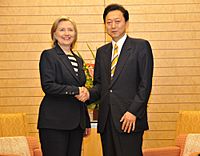
Hatoyama wanted to change Japan's foreign policy. He aimed to shift Japan's focus from being mainly centered on America to having a stronger focus on Asia. He also wanted to make foreign policy decisions with America more open and clear.
The DPJ's election plan suggested looking closely at Japan's relationship with the United States. Hatoyama called for a "close and equal" relationship between Japan and the U.S., meaning Japan would have more independence in its role.
Hatoyama ended an eight-year mission in Afghanistan where Japan had been refueling ships. This was a significant move because the mission had been criticized for possibly going against Japan's peaceful Constitution. To keep good relations with Washington, Hatoyama offered $5 billion in aid for Afghanistan's rebuilding.
Hatoyama also faced the issue of moving the American Futenma Marine Corps Air Base. The U.S. government hoped Hatoyama would follow an agreement from 2006 to move the base to a less populated part of Okinawa. However, some in the DPJ wanted all American military bases to leave Okinawa. Hatoyama had to balance public opinion in Okinawa with the desire to keep strong ties with the U.S.
To build stronger ties with Asia, Hatoyama worked to improve relations with nearby East Asian countries. He even said that "the Japanese Islands don't belong to only Japanese." He pushed for closer economic ties in Asia, suggesting a free trade zone by 2020. Relations with China also improved under Hatoyama. There were exchanges of visits, and discussions about promoting understanding over historical issues.
Resignation from Office
On June 2, 2010, Hatoyama announced his resignation as Prime Minister. He said the main reason was breaking a promise to close an American military base on Okinawa. On May 28, 2010, he had agreed with U.S. President Barack Obama to keep the base for security reasons, but this decision was not popular in Japan. He also mentioned money issues involving a top party leader, Ichirō Ozawa, who also resigned. Hatoyama was pressured to step down by members of his party because his approval ratings were low before an upcoming election.
Hatoyama's Cabinet
| Deputy Prime Minister Minister of Finance Minister of State for Economic and Fiscal Policy |
Naoto Kan |
| Minister of Internal Affairs and Communications Minister of State for Promotion of Local Sovereignty |
Kazuhiro Haraguchi |
| Minister of Justice | Keiko Chiba |
| Minister of Foreign Affairs | Katsuya Okada |
| Minister of Education, Culture, Sports, Science and Technology Minister of State for Science and Technology Policy |
Tatsuo Kawabata |
| Minister of Health, Labour and Welfare Minister of State for Pension Reform |
Akira Nagatsuma |
| Minister of Agriculture, Forestry and Fisheries | Hirotaka Akamatsu |
| Minister of Economy, Trade and Industry | Masayuki Naoshima |
| Minister of Land, Infrastructure, Transport and Tourism Minister of State for Okinawa and Northern Territories Affairs |
Seiji Maehara |
| Minister of the Environment | Sakihito Ozawa |
| Minister of Defence | Toshimi Kitazawa |
| Chief Cabinet Secretary Minister of State for Consumer Affairs, Food Safety, Social Affairs, and Gender Equality |
Hirofumi Hirano |
| Chairman of the National Commission on Public Safety Minister of State for Disaster Management Minister of State for the Abduction Issue |
Hiroshi Nakai |
| Minister of State for Financial Services Minister of State for Postal Reform |
Shizuka Kamei |
| Minister of State for the New Concept of Public Service Minister of State for Civil Service Reform Minister of State for National Policy |
Yoshito Sengoku |
| Minister of State for Government Revitalisation | Yukio Edano |
After Being Prime Minister
After stepping down as Prime Minister, Hatoyama continued to serve as a member of the DPJ in the Diet (Japan's parliament). When Prime Minister Yoshihiko Noda proposed a law to raise the consumption tax, Hatoyama was one of the lawmakers who voted against it. His membership in the DPJ was temporarily suspended.
Hatoyama did not leave the DPJ to join other parties. He continued to work within the DPJ to oppose both the consumption tax increase and the restart of nuclear power plants. In July 2012, he spoke to protesters outside the prime minister's residence, saying it was too soon to restart nuclear reactors.
Before the general election in December 2012, the DPJ announced that it would not support candidates who disagreed with its current policies. On November 21, Hatoyama announced that he would retire from politics.
In January 2013, Hatoyama expressed an apology to the victims of Japanese war crimes in China during a visit to Nanjing. He also urged the Japanese government to acknowledge the disagreement between the two countries about the ownership of the Diaoyu/Senkaku Islands.
In March 2015, Hatoyama visited Crimea. In August 2015, Hatoyama visited the Seodaemun Prison History Hall in Korea. He knelt and bowed before a memorial for Korean independence activists who died during Japan's occupation. He expressed his regret for Japan's occupation of Korea.
Hatoyama practices a meditation technique called Transcendental Meditation. He gave a speech at Maharishi University of Management in May 2015 and received an honorary degree.
Hatoyama continues to share his opinions openly even after retiring from politics. He is one of the most followed Japanese politicians on Twitter and regularly comments on current events. In 2023, he made a controversial statement on Twitter about Ukraine, for which he later apologized, explaining it was a translation issue.
In 2020, Hatoyama formed the Kyowa Party with Nobuhiko Shuto. He announced he wanted to run for office in the next election. However, his former DPJ colleagues were surprised because he claimed to form a party without clear political allies. He stepped down from the party in September 2022.
His son, Kiichirō, was elected to the House of Representatives in the October 2024 election as a candidate for the Democratic Party For the People.
Awards and Recognition
Sustainable Development Leadership Award
On February 5, 2010, Hatoyama received the Sustainable Development Leadership Award at the Delhi Sustainable Development Summit. He was given this award for his efforts to address climate change and for making it a main issue for his government.
Time 100
In 2010, Time magazine included Hatoyama in its "Time 100" list of the 100 most influential people in the world. The magazine noted that Hatoyama had "helped change his country from a de facto one-party state into a functional democracy" through the DPJ's victory in the 2009 general election.
See also
 In Spanish: Yukio Hatoyama para niños
In Spanish: Yukio Hatoyama para niños
- Hatoyama Hall
 | Madam C. J. Walker |
 | Janet Emerson Bashen |
 | Annie Turnbo Malone |
 | Maggie L. Walker |


